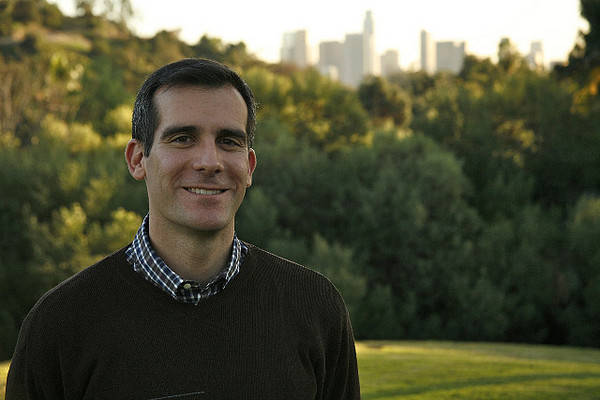Voter Turnout in LA Elections Lowest in City History


The two-year campaign process in the race for mayor of Los Angeles came to a close on Tuesday. As of 3:00 AM Wednesday, Eric Garcetti was elected mayor of the city.
Garcetti beat out his opponent, Wendy Greuel, with 54 percent of the vote to succeed Mayor Antonio Villaraigosa. He will also be the youngest mayor in the city's history.
Despite lowered voter expectations, mayoral candidates Wendy Greuel and Eric Garcetti spent furiously in the last week of campaigning, courting voters in pizza parlors, churches, and all points in between.
A recent poll conducted by the LA Times concluded that Garcetti had initially led Greuel by 48 percent to her 41 percent on the day of the election.
The Times recently reported that this mayoral race has been a costly one, with campaign totals reaching the $33 million mark on Saturday, May 18. The Times further reported that Garcetti had outspent Greuel on radio and television campaign advertisements, though Greuel seemed to garner a wider variety of support from "outside groups."
Why such low voter turnouts?
There was a degreee of apathy surrounding this race as only one in four registered voters turned out on election day. As a rather socially groundbreaking race -- Greuel vying to be the first woman mayor in LA and Garcetti running to be the first Jewish mayor -- it is surprising the degree of indifference among voters.
Also, there were three ballot measures regarding how to regulate medical marijuana dispensaries within city limits. This, if anything, should have attracted more younger voters to the polls. Regardless, this election -- despite negative attack ads from both parties -- garnered little attention in the Southern California metropolis.
Not only was voter turnout low, reports indicate the 2013 elections had the lowest turnout in the city's history.
Despite facing strong opposition from labor unions in this costly election, mayor-elect Garcetti plans to use his experience in city council to face the $100 million budget gap, as well as address the city's growing pension problem.
“We have to fix basic things, not just patch potholes but pave the streets,” Garcetti told the Times. “We don’t want to just have unemployed people going back to work, but we want to make sure they have a career path.”
Garcetti was unanimously elected LA city council president in 2005 and subsequently reelected in 2007 and 2009. Despite the looming financial problems the city still faces, he feels optimistic about pulling the city out of the recession.
“Los Angeles is ready to put the recession in the rearview mirror and become the city of opportunity that I grew up in once again,” Garcetti told supporters at a LA night club. “It’s time for Los Angeles not just to be a big city, but a great city once again. Whether you’re down and out or whether you’re at the top, we all believe one thing: that L.A. is worth fighting for.”
This mayoral race will have huge implications for not only LA, but the way policy is shaped in Sacramento as well. LA seems to remain a bellwether of public policy for Southern California -- and the rest of the state.



